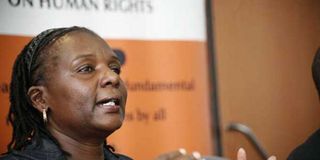Kenya on the spot over human rights violations

Kenya National Commission on Human Rights Commissioner Shatikha Chivusia at a past event. She has asked the African Commission to recommend to Kenya to review and amend laws that criminalise the freedom of expression. FILE PHOTO | PHOEBE OKALL | NATION MEDIA GROUP
What you need to know:
- The government has in some cases failed to give requested information or failed to reply to correspondence that seek information.
- The organisations also raised concerns that the criminal justice sector had been notorious with pre-trial detention.
BANJUL
Kenya human rights record has been put on the spot at the African Commission on Human and People’s Rights conference in Banjul, Gambia.
Local and international organisations criticised the country over extra judicial killings especially in the fight against organised crime and terrorism, refugee rights and failure to address issues of internally displaced persons.
Of major concerns also were the suppression of press freedom, adoption of laws that criminalise freedom of expression and the punitive approach to the management of the civil society.
Kenya was criticised despite presenting a statement indicating what the country has done to uphold human rights and dignity.
The Kenya National Commission on Human Rights (KNHCR) and 14 non-governmental organisations indicated that the country suppresses several rights in the name of combating crime as well as creating stringent laws.
“We urge the African Commission to recommend that Kenya expedites amendment of the legislation of the Access to Information legislation to ensure that its citizenry enjoys the benefits that it has committed to under the constitution and in line with its international obligations,” KNCHR Commissioner Shatikha Chivusia said.
She also asked the African Commission to recommend to Kenya to review and amend laws that criminalise the freedom of expression so as to align them with the African Court’s ruling in Konate Vs Bukina Faso that criminal defamation provisions in statutes amounts to violation of the African Charter.
Ms Miriam Bomett, a programme officer with Kenya’s Section of the International Commission of Jurists said the government has failed to publish and introduce for debate in Parliament, a Bill on access to information.
“As a result, it becomes unclear how a citizen can initiate a request for information and how the relevant government departments should deal with requests for information.
“The government has in some cases failed to give requested information or failed to reply to correspondence that seek information, probably because of lack of clarity as to who is responsible within the departments and also because they do not know whether it is right to give the information,” Ms Bomett said.
HEAVY FINES
She also raised concerns about the proposal to introduce provisions in the Kenya Information and Communication Act, 1998 and the Media Act 2012 that stipulates heavy fines or jail terms for journalists and others deemed to have defamed the country’s parliament.
Organisations attending the 57th ordinary session in Banjul include the Independent Medico Legal Unit, Article 19 East Africa, Kenya Human Rights Commission, Refugee consortium of Kenya among others.
The organisations also raised concerns that the criminal justice sector had been notorious with pre-trial detention.
Police reforms, they said, has not portrayed accountability and has also not addressed human rights violations by members of the service.
Kenya Police Spokesperson, Charles Owino, who is attending the conference, is expected to address issues raised about the police in Kenya. Attorney General Githu Muigai will also make a presentation.
African Policing Civilian Oversight Authority, raised concerns that the Independent Policing Oversight Authority’s mandate in the quest for reforms may not succeed if the body’s independence is compromised.
The government submitted a report listing the devolution of government, the abolition of the maternity charges, vetting of police officers and eliminating those who violated human rights, the introduction of public participation and the allocation of more funds to persons with disability as some of the major strides it has made since it embraced the African Charter.





